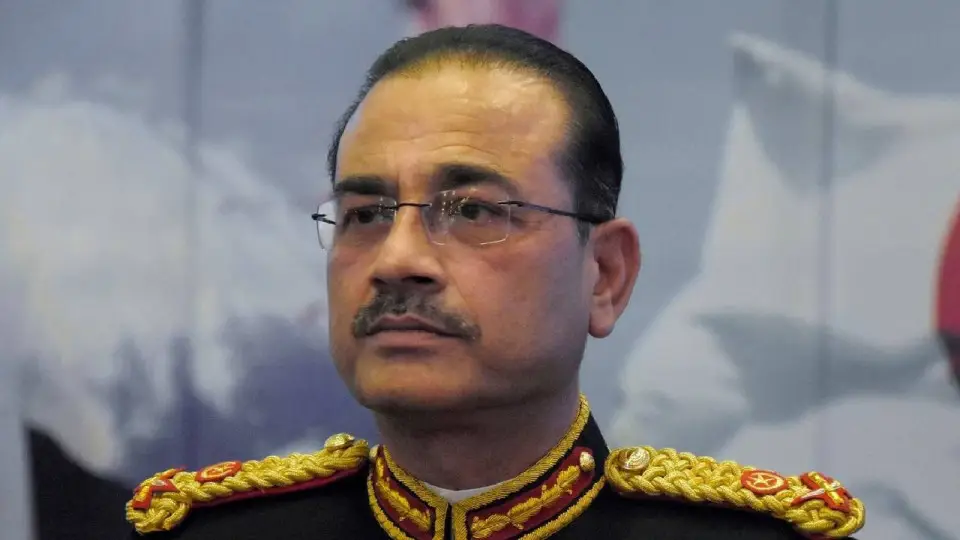
Credit:Top Indian News (Credit:Top Indian News)
National News: Pakistan’s Chief of Army Staff General Asim Munir has directly warned Afghanistan’s Taliban leadership during a powerful public speech. He told Kabul that the time had come to make a clear choice between peace and chaos. Speaking after Pakistan launched airstrikes on suspected militant bases inside Afghanistan, Munir insisted that no country would be allowed to harbor terrorists who strike across the border.
His words were delivered at a military ceremony in Abbottabad, sending a strong signal not only to Taliban rulers but also to the global community observing the tense situation.
The latest air operations inside Afghanistan came only hours after a fragile ceasefire extension was announced between Islamabad and Kabul. Pakistan’s military claimed the strikes were necessary because militant groups were staging attacks from Afghan soil. Just a day earlier, a Pakistani army camp in North Waziristan was targeted with guns and explosives, leaving several soldiers dead.
The assault was claimed by Tehrik-e-Taliban Pakistan’s Hafiz Gul Bahadur faction, known for cross-border militancy. Pakistan’s leadership declared the strikes were in retaliation and warned of more decisive action if such attacks continue.
For months, Islamabad has pressed the Taliban government to clamp down on extremist outfits, accusing Kabul of letting them operate freely in border provinces. Pakistani officials argue that Afghan territory is being misused to launch terrorist operations that destabilize the entire region. Kabul, however, denies the allegations, saying its soil is not being used against neighbors.
Despite these denials, intelligence reports and continuous attacks have strengthened Pakistan’s suspicion that Taliban officials are turning a blind eye. The issue has widened mistrust between two uneasy neighbors who share deep historical and cultural ties.
In his address at the Pakistan Military Academy in Abbottabad, Munir declared that all proxies working against Pakistan would be “crushed into dust.” His comments underline a policy shift in which Pakistan seems ready to escalate its military response against militants instead of relying on long, drawn-out talks.
He emphasized that patience is running out and any group launching violence from Afghan areas will be dealt with harshly. Analysts say this reflects frustration in Islamabad, as repeated dialogue efforts have failed to stop deadly attacks on Pakistani forces in recent months.
The escalation comes at a time when both sides were expected to meet in Doha under Qatari mediation. Diplomatic sources hoped that dialogue could create a roadmap for border security cooperation. However, the new airstrikes and Munir’s blunt warnings now cast a shadow on those talks. Observers believe Afghanistan may react sharply, while Pakistan insists it cannot compromise on the safety of its citizens and soldiers. The tension raises fears that instead of easing, hostilities may rise further, pulling both countries into a dangerous cycle of strikes and counterstrikes.
The relationship between Islamabad and Kabul has often swung between uneasy cooperation and open hostility. The banned Tehrik-e-Taliban Pakistan has been the main irritant, accused of using Afghan hideouts to regroup after every major offensive. Recent attacks in Pakistan’s tribal belt have only deepened suspicion.
The most shocking incident came in Orakzai district of Khyber Pakhtunkhwa, where 11 soldiers, including a Lieutenant Colonel and a Major, were killed. For Pakistan, such losses are unacceptable, and they add pressure on the government to demand accountability from Taliban leaders.
The crisis has once again highlighted how fragile the security situation is in South Asia. With both nations suffering from economic hardship, another cycle of violence could worsen the misery of ordinary people. Experts warn that prolonged hostilities may also push global actors like the United States, China, and Russia to intervene diplomatically.
For Pakistan, the choice is survival and stability; for Afghanistan, it is recognition and legitimacy. Unless the Taliban takes visible steps against militants, peace in the region will remain a distant dream overshadowed by fear and suspicion.













Copyright © 2025 Top Indian News
